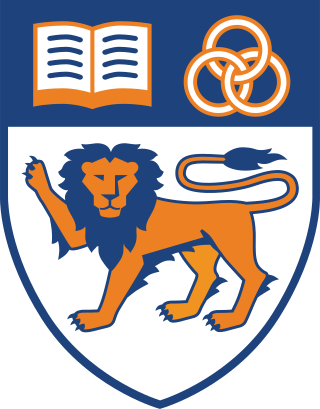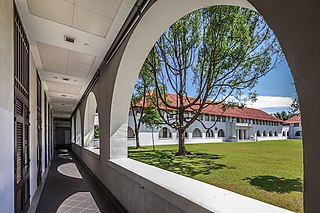Related Research Articles

Singapore maintains diplomatic relations with 189 UN member states. The three exceptions are the Central African Republic, Monaco and South Sudan.

The Association of Southeast Asian Nations, commonly abbreviated as ASEAN, is a political and economic union of 10 states in Southeast Asia. Together, its member states represent a population of more than 600 million people and land area of over 4.5 million km2 (1.7 million sq mi). The bloc generated a purchasing power parity (PPP) gross domestic product (GDP) of around US$10.2 trillion in 2022, constituting approximately 6.5% of global GDP (PPP). ASEAN member states include some of the fastest growing economies in the world, and the institution plays an integral role in East Asian regionalism.

The National University of Singapore (NUS) is a national public research university in Singapore. It was officially established in 1980 by the merger of the University of Singapore and Nanyang University.

Kishore Mahbubani is a Singaporean diplomat and geopolitical consultant who served as Singapore Permanent Representative to the United Nations between 1984 and 1989, and again between 1998 and 2004, and President of the United Nations Security Council between 2001 and 2002.

The National University of Singapore Faculty of Law is Singapore's oldest law school. NUS Law was initially established in 1956 as the Department of Law in the University of Malaya, and subsequently, University of Singapore. After its establishment, NUS Law was Singapore's only law school for half a century, until the subsequent establishment of the SMU School of Law in 2007 and the SUSS School of Law in 2017. NUS Law is currently located at the NUS Bukit Timah Campus. The current dean of NUS Law is Andrew Simester. Internationally, NUS Law has been ranked twelfth by the QS World University Rankings by Subject in 2024 and eleventh by the Times Higher Education World University Rankings by Subject in 2024.
The Institute of Policy Studies (IPS) is a think-tank that studies and generates public policy ideas in Singapore. Established in 1988, IPS became an autonomous research centre of the Lee Kuan Yew School of Public Policy at the National University of Singapore in 2008. A centre for social indicators research, Social Lab, was set up by IPS in November 2013. The board of directors at the institute includes high ranking Singapore government officials, diplomats, directors of multinational businesses, and leaders of academic institutions.
Tommy Koh Thong Bee is a Singaporean diplomat, lawyer, professor and author who served as Singapore's Permanent Representative to the United Nations between 1968 and 1971.
The Lee Kuan Yew School of Public Policy is an autonomous postgraduate school of the National University of Singapore (NUS), named after the late former Prime Minister of Singapore, Lee Kuan Yew.

The Asia/Pacific Group on Money Laundering (APG) is a FATF-style regional inter-governmental (international) body, the members of which are committed to effectively implementing the international standards against money laundering, combating the financing of terrorism (CFT) and financing the proliferation of weapons of mass destruction. APG was founded in 1997 in Bangkok, Thailand, and currently consists of 42 member jurisdictions in the Asia-Pacific region and a number of observer jurisdictions and international/regional observer organisations.

The Economic Research Institute for ASEAN and East Asia or ERIA is an international organization established in Jakarta, Indonesia in 2008 by a formal agreement among Leaders of 16 countries in the East Asian region to conduct research activities and make policy recommendations for further economic integration in the East Asia. ERIA works very closely with both the ASEAN Secretariat and 16 Research Institutes to undertake and disseminate policy research under the three pillars, namely “Deepening Economic Integration”, ”Narrowing Development Gaps”, and “Sustainable Development” and provide analytical policy recommendations to Leaders and Ministers at their regional meetings. ERIA provides intellectual contributions to East Asian Community building and serves as a Sherpa international organization. ERIA Ranks 9th among the world's "Top International Economics Think Tanks" according to the 2020 Global Go To Think Tanks Index Report conducted by the University of Pennsylvania.

Shankar P. Sharma, is a senior Economist and Diplomat who is currently serving as the Ambassador of Nepal to India. He was the Ambassador of Nepal to the United States from 2009-2014. Dr. Sharma served as the Vice-Chairman of the National Planning Commission from 2002 to 2006. He has a Ph.D. in economics from the University of Hawaii.

Simon Chesterman is an Australian legal academic and writer who is currently a vice provost at the National University of Singapore and dean of the NUS College. He was the dean of NUS Faculty of Law from 2012 to 2022. He is also senior director of AI governance at AI Singapore, editor of the Asian Journal of International Law and co-president of the Law Schools Global League.
The European Union (EU) Centre in Singapore is part of a global network of European Union Centres of Excellence. Following the launch of EU Centres of Excellence in the US and Canada in 1998, there are now 37 Centres located in Australia, Canada, Hong Kong, Japan, Macao, New Zealand, Russia, South Korea, Taiwan and the United States.

Tan Tai Yong is a Singaporean academic who is the current President of Singapore University of Social Sciences. He served as the President of Yale-NUS College from 2017 to 2022. He is also Chairman of the Management Board of the Institute of South Asian Studies, an autonomous university-level research institute in NUS. He was a former Nominated Member of Parliament and served from 2014 to 2015.
The Singapore Institute of International Affairs (SIIA) is a Singaporean research institute and think tank which focuses on international relations, especially in ASEAN and the Asia-Pacific (APAC). The Institute conducts research, hosts events, and plans conferences that deal with pressing issues in international affairs. It is the oldest think tank in Singapore, being founded in 1961.

The Forum for East Asia-Latin America Cooperation or is a regional forum of 36 countries constituting the region of East, Southeast Asia, Oceania, and Latin America that came together to form an official and regular dialogue channel between the two regions.

Lily L.L. Kong is a Singaporean geographer currently serving as president of the Singapore Management University (SMU). She is the first female and Singaporean academic to helm a Singapore university. Prior joining SMU, she was a faculty member at the Department of Geography of the National University of Singapore (NUS) and had held various senior managerial positions at NUS.

Tan Tin Wee is a Singaporean bioinformatician and university lecturer. He is an associate professor at the Department of Biochemistry at the National University of Singapore and Chief Executive of the National Supercomputing Center (NSCC) Singapore. As the inventor and founder of multilingual internationalized domain names (IDN) and a pioneer of the Internet, he was inducted into the Internet Society of 2012 along with the founding fathers of the Internet in the first Internet Hall of Fame. He is well known in Singapore and the region for his work on propagating and developing the Internet.

Rahmat bin Mohamad is a Malaysian Legal scholar and Professor of Law at the Universiti Teknologi MARA. He previously served as Chairman of the Asian International Arbitration Centre (AIAC). He also served as Chairman of the National Sports Institute of Malaysia from August 2019 to August 2023 and the Chairman of the Human Rights Commission of Malaysia (SUHAKAM) from August 2022 until August 2023.

Vilawan Mangklatanakul is a Thai lawyer and diplomat at Ministry of Foreign Affairs of Thailand. She joined the Foreign Service in 1995 and currently serves as Deputy Permanent Secretary for Foreign Affairs. In November 2021, Mangklatanakul was elected as one of the International Law Commission (ILC) Members for the term 2023–2027, making her the first Thai woman national and international lawyer from the Association of Southeast Asian Nations (ASEAN) region to serve the position.
References
- ↑ Staff writer (2024). "Centre for International Law, Singapore (CIL)". UIA Global Civil Society Database. uia.org. Brussels, Belgium: Union of International Associations. Yearbook of International Organizations Online. Retrieved 24 December 2024.
- ↑ About CIL. NUS (retrieved nov 2024)
- ↑ Ministry of Education, Singapore: Speeches Archived June 16, 2009, at the Wayback Machine
- ↑ "S'pore to set up new centre for international law", Straits Times, 28 February 2008